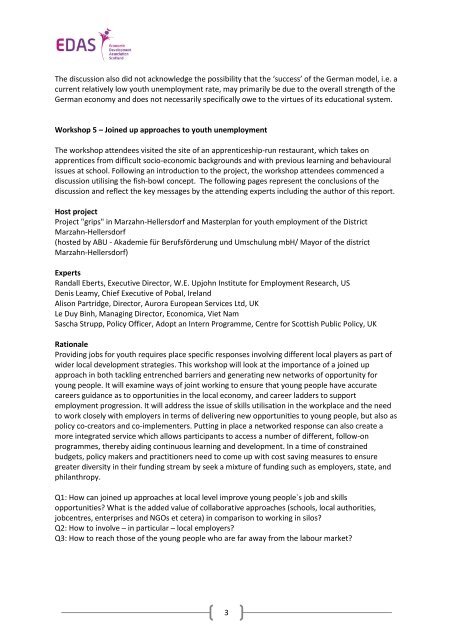Annual Meeting PARTNERSHIPS FOR YOUTH - Economic Development ...
Annual Meeting PARTNERSHIPS FOR YOUTH - Economic Development ...
Annual Meeting PARTNERSHIPS FOR YOUTH - Economic Development ...
You also want an ePaper? Increase the reach of your titles
YUMPU automatically turns print PDFs into web optimized ePapers that Google loves.
The discussion also did not acknowledge the possibility that the ‘success’ of the German model, i.e. a<br />
current relatively low youth unemployment rate, may primarily be due to the overall strength of the<br />
German economy and does not necessarily specifically owe to the virtues of its educational system.<br />
Workshop 5 – Joined up approaches to youth unemployment<br />
The workshop attendees visited the site of an apprenticeship-run restaurant, which takes on<br />
apprentices from difficult socio-economic backgrounds and with previous learning and behavioural<br />
issues at school. Following an introduction to the project, the workshop attendees commenced a<br />
discussion utilising the fish-bowl concept. The following pages represent the conclusions of the<br />
discussion and reflect the key messages by the attending experts including the author of this report.<br />
Host project<br />
Project "grips" in Marzahn-Hellersdorf and Masterplan for youth employment of the District<br />
Marzahn-Hellersdorf<br />
(hosted by ABU - Akademie für Berufsförderung und Umschulung mbH/ Mayor of the district<br />
Marzahn-Hellersdorf)<br />
Experts<br />
Randall Eberts, Executive Director, W.E. Upjohn Institute for Employment Research, US<br />
Denis Leamy, Chief Executive of Pobal, Ireland<br />
Alison Partridge, Director, Aurora European Services Ltd, UK<br />
Le Duy Binh, Managing Director, <strong>Economic</strong>a, Viet Nam<br />
Sascha Strupp, Policy Officer, Adopt an Intern Programme, Centre for Scottish Public Policy, UK<br />
Rationale<br />
Providing jobs for youth requires place specific responses involving different local players as part of<br />
wider local development strategies. This workshop will look at the importance of a joined up<br />
approach in both tackling entrenched barriers and generating new networks of opportunity for<br />
young people. It will examine ways of joint working to ensure that young people have accurate<br />
careers guidance as to opportunities in the local economy, and career ladders to support<br />
employment progression. It will address the issue of skills utilisation in the workplace and the need<br />
to work closely with employers in terms of delivering new opportunities to young people, but also as<br />
policy co-creators and co-implementers. Putting in place a networked response can also create a<br />
more integrated service which allows participants to access a number of different, follow-on<br />
programmes, thereby aiding continuous learning and development. In a time of constrained<br />
budgets, policy makers and practitioners need to come up with cost saving measures to ensure<br />
greater diversity in their funding stream by seek a mixture of funding such as employers, state, and<br />
philanthropy.<br />
Q1: How can joined up approaches at local level improve young people`s job and skills<br />
opportunities? What is the added value of collaborative approaches (schools, local authorities,<br />
jobcentres, enterprises and NGOs et cetera) in comparison to working in silos?<br />
Q2: How to involve – in particular – local employers?<br />
Q3: How to reach those of the young people who are far away from the labour market?<br />
3


